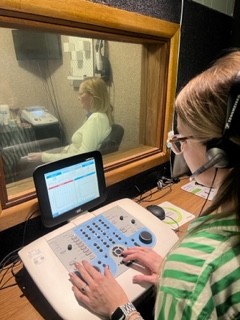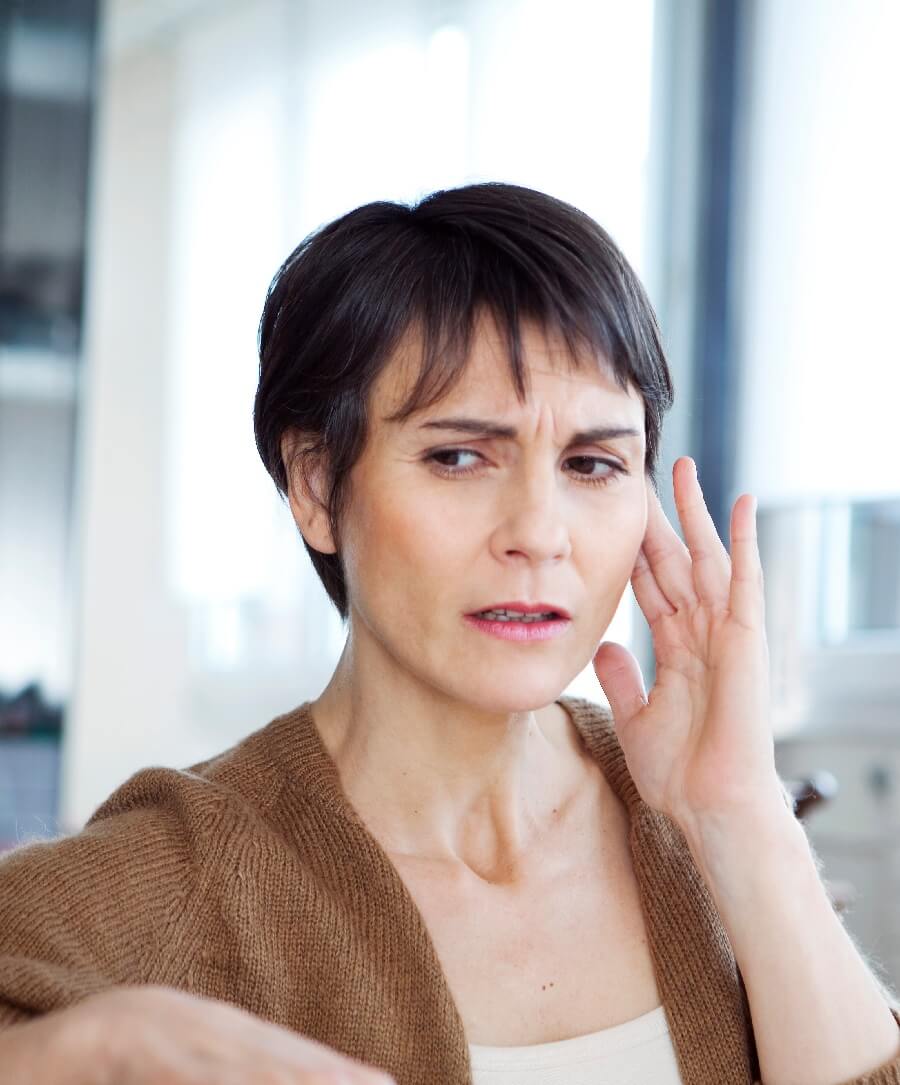Delivering the Highest Levels of Community-Focused Hearing Healthcare in Ventura and Ojai
Delivering the Highest Levels of Community-Focused Hearing Healthcare in Ventura and Ojai
Some clinics follow audiological best practices, Nelson Audiology defines them.
Some clinics follow audiological best practices, Nelson Audiology defines them.
Trusted By
Trusted By
Trusted By









“Many people believe the narrative that a hearing aid is the solution to a hearing loss.
“Yet if you ask somebody that has successfully achieved better hearing, they will tell you that great hearing technology is only part of the puzzle; the much more important component is partnering with the right team of hearing experts.
“Having supported the Ojai and Ventura communities for 10 years as the lead doctor of audiology at West Coast Hearing & Balance, I purchased both locations in 2022 and I’m now passionately working with the same locally respected team to continue to further improve an already outstanding reputation.
“If you or a loved one is concerned about your hearing and would like to partner with a team that invests their efforts into your long-term hearing healthcare, then we are here for you!”
A Personal Message from Owner, Dr. Lance Nelson
Our Services

The Importance of Regular Hearing Assessments
While we regularly check our eyes and teeth and have yearly physicals, few of us get our hearing tested. With 1 in 8 Americans suffering from a measurable hearing loss, it’s never been more important to prioritize a regular hearing test.
Gradual hearing loss can evade detection, as daily changes are hard to measure and compare to past hearing ability. A diagnostic hearing evaluation offers a comprehensive examination of hearing health, going beyond just detecting hearing loss to concentrating on overall hearing well-being.

Helping You to Find the Right Hearing Technology for Your Unique Needs, Circumstances, and Budget
Nobody grows up looking forward to the day when they can wear their first hearing aids, but with hearing loss impacting as many as 1 in 5 people, it’s a step that tens of thousands of people take each year.
The good news is that hearing technology has vastly improved, replacing the old, bulky devices that many of us hold a stigma against. Today’s hearing aids are small, discreet, and in some cases, even invisible.
As an independent clinic, we have the flexibility to choose the best technology for each patient’s unique circumstances, needs, and budget without being limited to a single manufacturer, ensuring that we can always find the right technology to meet your unique needs.

Helping You to Regain Control of Tinnitus
A persistent ringing, buzzing, or hissing in your ears is a frustrating condition. Seventy-five percent of people experience tinnitus at some point, ranging from a mild inconvenience to debilitating.
Nelson Audiology offers a comprehensive range of solutions, including hearing technology, sound therapy, and tinnitus management, to help local people regain control of their tinnitus.
If you or a loved one is experiencing challenges with tinnitus, then schedule a comprehensive evaluation and we’ll help you to regain control.

Restoring the Performance of Your Hearing Aids
Even with the best hearing aids, daily use can lead to wear, damage, or performance issues over time. At Nelson Audiology, we provide expert repair and maintenance services to keep your devices working like new.
From simple cleanings and tubing replacements to more advanced repairs, our skilled team quickly identifies and resolves problems to ensure clear, consistent hearing. Whether your hearing aids were purchased from us or elsewhere, we’re here to help you restore comfort and clarity.
Our Services

The Importance of Regular Hearing Assessments
While we regularly check our eyes and teeth and have yearly physicals, few of us get our hearing tested. With 1 in 8 Americans suffering from a measurable hearing loss, it’s never been more important to prioritize a regular hearing test.
Gradual hearing loss can evade detection, as daily changes are hard to measure and compare to past hearing ability. A diagnostic hearing evaluation offers a comprehensive examination of hearing health, going beyond just detecting hearing loss to concentrating on overall hearing well-being.

Helping You to Find the Right Hearing Technology for Your Unique Needs, Circumstances, and Budget
Nobody grows up looking forward to the day when they can wear their first hearing aids, but with hearing loss impacting as many as 1 in 5 people, it’s a step that tens of thousands of people take each year.
The good news is that hearing technology has vastly improved, replacing the old, bulky devices that many of us hold a stigma against. Today’s hearing aids are small, discreet, and in some cases, even invisible.
As an independent clinic, we have the flexibility to choose the best technology for each patient’s unique circumstances, needs, and budget without being limited to a single manufacturer, ensuring that we can always find the right technology to meet your unique needs.

Helping You to Regain Control of Tinnitus
A persistent ringing, buzzing, or hissing in your ears is a frustrating condition. Seventy-five percent of people experience tinnitus at some point, ranging from a mild inconvenience to debilitating.
Nelson Audiology offers a comprehensive range of solutions, including hearing technology, sound therapy, and tinnitus management, to help local people regain control of their tinnitus.
If you or a loved one is experiencing challenges with tinnitus, then schedule a comprehensive evaluation and we’ll help you to regain control.

Restoring the Performance of Your Hearing Aids
Even with the best hearing aids, daily use can lead to wear, damage, or performance issues over time. At Nelson Audiology, we provide expert repair and maintenance services to keep your devices working like new.
From simple cleanings and tubing replacements to more advanced repairs, our skilled team quickly identifies and resolves problems to ensure clear, consistent hearing. Whether your hearing aids were purchased from us or elsewhere, we’re here to help you restore comfort and clarity.
Our Services

The Importance of Regular Hearing Assessments
While we regularly check our eyes and teeth and have yearly physicals, few of us get our hearing tested. With 1 in 8 Americans suffering from a measurable hearing loss, it’s never been more important to prioritize a regular hearing test.
Gradual hearing loss can evade detection, as daily changes are hard to measure and compare to past hearing ability. A diagnostic hearing evaluation offers a comprehensive examination of hearing health, going beyond just detecting hearing loss to concentrating on overall hearing well-being.

Helping You to Find the Right Hearing Technology for Your Unique Needs, Circumstances, and Budget
Nobody grows up looking forward to the day when they can wear their first hearing aids, but with hearing loss impacting as many as 1 in 5 people, it’s a step that tens of thousands of people take each year.
The good news is that hearing technology has vastly improved, replacing the old, bulky devices that many of us hold a stigma against. Today’s hearing aids are small, discreet, and in some cases, even invisible.
As an independent clinic, we have the flexibility to choose the best technology for each patient’s unique circumstances, needs, and budget without being limited to a single manufacturer, ensuring that we can always find the right technology to meet your unique needs.

Helping You to Regain Control of Tinnitus
A persistent ringing, buzzing, or hissing in your ears is a frustrating condition. Seventy-five percent of people experience tinnitus at some point, ranging from a mild inconvenience to debilitating.
Nelson Audiology offers a comprehensive range of solutions, including hearing technology, sound therapy, and tinnitus management, to help local people regain control of their tinnitus.
If you or a loved one is experiencing challenges with tinnitus, then schedule a comprehensive evaluation and we’ll help you to regain control.

Restoring the Performance of Your Hearing Aids
Even with the best hearing aids, daily use can lead to wear, damage, or performance issues over time. At Nelson Audiology, we provide expert repair and maintenance services to keep your devices working like new.
From simple cleanings and tubing replacements to more advanced repairs, our skilled team quickly identifies and resolves problems to ensure clear, consistent hearing. Whether your hearing aids were purchased from us or elsewhere, we’re here to help you restore comfort and clarity.
Request a Callback
Many of our patients wish that they had contacted us a long time prior to the moment that they did.
If you’re ready to start your hearing journey or would like to schedule an appointment, then you can either call the number below or complete the form on this page.
Don’t want to wait? Call Us at (805) 633-9063
Request a Callback
Many of our patients wish that they had contacted us a long time prior to the moment that they did.
If you’re ready to start your hearing journey or would like to schedule an appointment, then you can either call the number below or complete the form on this page.
Don’t want to wait? Call Us at (805) 633-9063
Request a Callback
Many of our patients wish that they had contacted us a long time prior to the moment that they did.
If you’re ready to start your hearing journey or would like to schedule an appointment, then you can either call the number below or complete the form on this page.
Don’t want to wait? Call Us at (805) 633-9063
People Travel to us From
Ventura
Oxnard
Carpenteria
Santa Barbara
Ojai
Somis
Casitas Springs
Oak View
Santa Paula
Saticoy
People Travel to us From
Ventura
Oxnard
Carpenteria
Santa Barbara
Ojai
Somis
Casitas Springs
Oak View
Santa Paula
Saticoy
People Travel to us From
Ventura
Oxnard
Carpenteria
Santa Barbara
Ojai
Somis
Casitas Springs
Oak View
Santa Paula
Saticoy
What Our Delighted Patients Say
The Ventura office staff is friendly and provides great service. I already wear hearing aids and went in for an annual checkup. Bryce did the testing. He is easy to talk to and answers any questions you have

Gail H
5 months ago
We have found Dr Nelson to be exceptional. Cathy particularly likes his Dr's "bedside manner" while I appreciate his technical expertise

P CJ
2 months ago
Excellent service and personnel.
Very happy I went through them to have my hearing checked. The doctor was very thorough and helped me through every step to get the right hearing aids.
Greg Senff
4 months ago
Excellent service and personnel.
Very happy I went through them to have my hearing checked. The doctor was very thorough and helped me through every step to get the right hearing aids.
Mary Garber
6 months ago
What Our Delighted Patients Say
The Ventura office staff is friendly and provides great service. I already wear hearing aids and went in for an annual checkup. Bryce did the testing. He is easy to talk to and answers any questions you have

Gail H
5 months ago
We have found Dr Nelson to be exceptional. Cathy particularly likes his Dr's "bedside manner" while I appreciate his technical expertise

P CJ
2 months ago
Excellent service and personnel.
Very happy I went through them to have my hearing checked. The doctor was very thorough and helped me through every step to get the right hearing aids.
Greg Senff
4 months ago
Excellent service and personnel.
Very happy I went through them to have my hearing checked. The doctor was very thorough and helped me through every step to get the right hearing aids.
Mary Garber
6 months ago
What Our Delighted Patients Say
The Ventura office staff is friendly and provides great service. I already wear hearing aids and went in for an annual checkup. Bryce did the testing. He is easy to talk to and answers any questions you have

Gail H
5 months ago
We have found Dr Nelson to be exceptional. Cathy particularly likes his Dr's "bedside manner" while I appreciate his technical expertise

P CJ
2 months ago
Excellent service and personnel.
Very happy I went through them to have my hearing checked. The doctor was very thorough and helped me through every step to get the right hearing aids.
Greg Senff
4 months ago
Excellent service and personnel.
Very happy I went through them to have my hearing checked. The doctor was very thorough and helped me through every step to get the right hearing aids.
Mary Garber
6 months ago
Our Experts Answer

How to Choose the Right Hearing Clinic: 5 Questions to Ask Before You Book

|
Lance Nelson, AuD, CCC-A
|
Oct 27, 2025
Empower your hearing journey by asking five key questions when choosing a hearing clinic. From regulated audiologists to top hearing aid brands, secure personalized, ethical care today.

How Hearing Aids Can Bring Clarity to Your Work, Relationships, and Life

|
Lance Nelson, AuD, CCC-A
|
Sep 1, 2025
Hearing loss doesn't just affect how you hear; it can also profoundly affect your workplace performance, confidence...

Why Buying a Hearing Aid Online Isn’t the Same as Hearing Care

|
Lance Nelson, AuD, CCC-A
|
Aug 15, 2025
Imagine this scenario: You're scrolling through your phone when an advertisement promises a revolutionary...
Our Experts Answer

How to Choose the Right Hearing Clinic: 5 Questions to Ask Before You Book

|
Lance Nelson, AuD, CCC-A
|
Oct 27, 2025
Empower your hearing journey by asking five key questions when choosing a hearing clinic. From regulated audiologists to top hearing aid brands, secure personalized, ethical care today.

How Hearing Aids Can Bring Clarity to Your Work, Relationships, and Life

|
Lance Nelson, AuD, CCC-A
|
Sep 1, 2025
Hearing loss doesn't just affect how you hear; it can also profoundly affect your workplace performance, confidence...
Our Experts Answer

How to Choose the Right Hearing Clinic: 5 Questions to Ask Before You Book

|
Lance Nelson, AuD, CCC-A
|
Oct 27, 2025
Empower your hearing journey by asking five key questions when choosing a hearing clinic. From regulated audiologists to top hearing aid brands, secure personalized, ethical care today.

How Hearing Aids Can Bring Clarity to Your Work, Relationships, and Life

|
Lance Nelson, AuD, CCC-A
|
Sep 1, 2025
Hearing loss doesn't just affect how you hear; it can also profoundly affect your workplace performance, confidence...

Why Buying a Hearing Aid Online Isn’t the Same as Hearing Care

|
Lance Nelson, AuD, CCC-A
|
Aug 15, 2025
Imagine this scenario: You're scrolling through your phone when an advertisement promises a revolutionary...
©2025 Nelson Hearing | All Rights Reserved
©2025 Nelson Hearing | All Rights Reserved
©2025 Nelson Hearing | All Rights Reserved
















